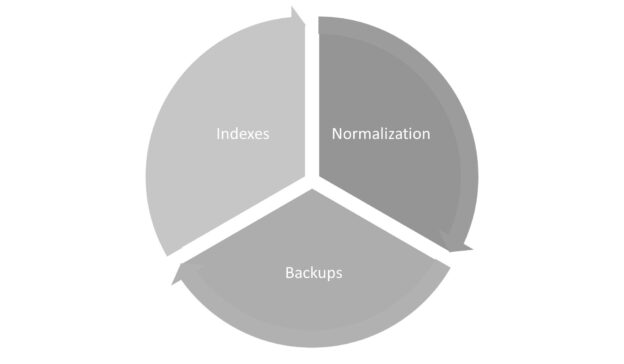Introduction
If you are applying to a new DBA job or a job that requires database knowledge, you probably want to study the most common questions in an interview. If that is your case, this article may be useful. The article contains typical questions about databases. The database interview questions that are typical are the following:

What is a database?
The most basic database interview questions are related to fundamentals. The concept of a database is a basic concept that you must know.
A database is a collection of organized data used to get information about a company, products, surveys, or any other topic. It can be stored in relational databases or nonrelational databases. This article will focus on relational databases. If you want to know more about nonrelational databases (NoSQL), please refer to these links:
- Understanding the differences between NoSQL and relational databases
- SQL Server JSON functions: a bridge between NoSQL and relational worlds
What is an RDBMS?
It is a Relational Database Management System. It is software to administer and develop a database using SQL. In a collection of Database interview questions, you will also be asked if you know what an RDBMS is. There are several RDBMS, you will be asked if you know some and some characteristics of the RDBMS.
What is a backup?
A backup allows us to save our information and restore it in cases of disasters.
We have a series of articles related to backups oriented to SQL Server, but may give you several concepts that can be applied to any DBMS:
What is SQL?
SQL stands for Structured Query Language. It is the language used by relational databases. There are several links to learn some basics of SQL Sentences. In the following article we provide several basic sentences:
- Overview of the SQL Insert statement
- Overview of the SQL Update statement
- Overview of the SQL Delete statement
- Overview of the SQL Order by clause
- Overview of the SQL LIKE Operator
- SQL Join overview and tutorial
SQL includes the following categories:
- DDL Data Definition Language
- DML Data Manipulation Language
- DCL Data Control Language
What are DDL, DML, and DCL?

DDL is the Data Definition Language to define objects like tables, views, stored procedures, and other database objects. You can CREATE, ALTER (modify) or DROP objects.
DML is used to insert, update, delete and query an object like a table or a view. For more information review the links to the preview question.
Finally, Data Control Language (DCL) is used to set up the user and permissions to the database or the objects in the database. The main sentences used are the GRANT to grant privileges to roles or users and REVOKE to revoke permissions and DENY to Deny permissions.
What is a Table and what is a view?
Another typical question in a group of database interview questions is what a view is. What is a table is not a common question, but you really need to know it.
- A table is a collection of rows and columns to collect data. For example, you can have a table with students’ information like the ID, Name, Lastname, email, etc.
What are database indexes?
In the database interview questions, you will always have a question related to indexes because the indexes are commonly used to increase performance. An index is a database structure usually applied in the table and sometimes in views to improve the performance of queries.
Depending on the DBMS, there are different types of indexes. The following article is oriented to SQL Server indexes, but it includes a lot of information that can be applied to any DBMS:
What are normalization and denormalization?
The most typical question in a collection of database interview questions is the normalization question. What is normalization?
Normalization is the process to design the database to reduce redundancy and to optimize the integrity of the data. There are 6 normalization forms: 1 NF, 2 NF…6 NF.
We created an amazing article about normalization here:
Denormalization is the opposite process of normalization. Is very common to apply denormalization to databases for reports. A denormalized database will have a better-read performance, but a poor write performance for updates.
What is database replication?
It is the process to create a copy of a database to replace the main one in cases of disasters. There are several types of replications. We created a complete group of database interview questions related to replication. The article is oriented to SQL Server, but it can give you a deeper knowledge about replication that can make you shine in the interview.
What DBMS do you know?
The most common databases are Microsoft SQL Server, Oracle, MySQL, PostgreSQL, DB2, MS Access, SQLite, MariaDB. You may be asked which ones you know how to use. Try to practice. You can get online simulators and practice the usage of these databases without installing them.

Conclusion
In this article, we learned different database interview questions. We learned some basic information about the databases that you may be asked for and some answers and references that may be useful. If you get the job, write your comments at the end of the article, or comment to us about your interview. Thanks a lot.
- PostgreSQL tutorial to create a user - November 12, 2023
- PostgreSQL Tutorial for beginners - April 6, 2023
- PSQL stored procedures overview and examples - February 14, 2023

